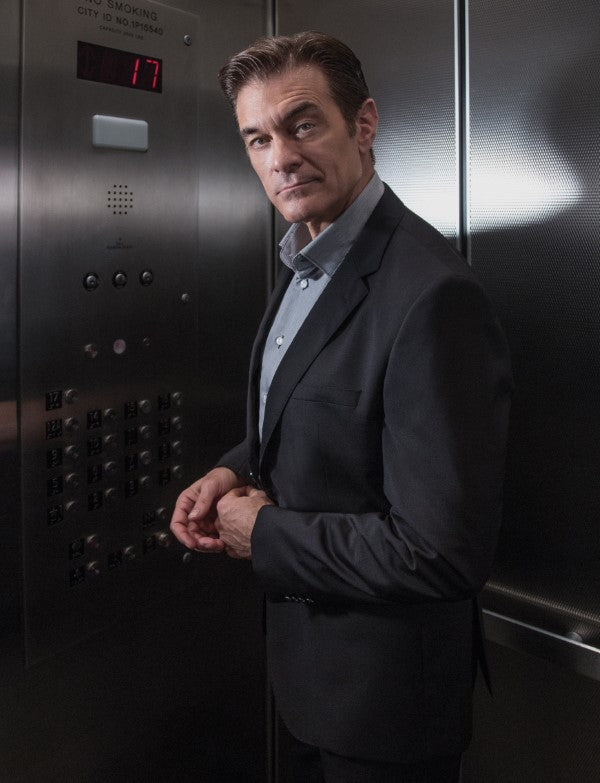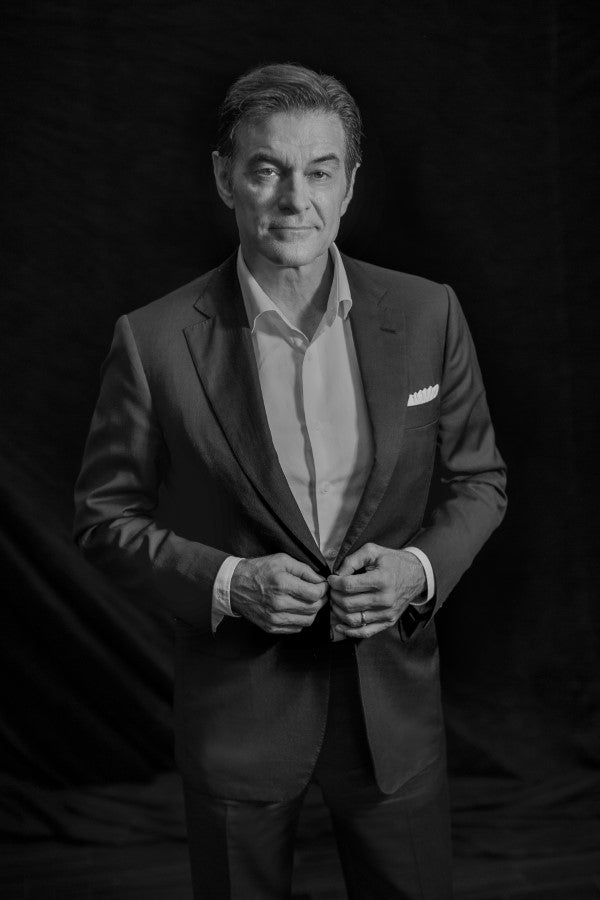America’s Fever-Pitched Experiment of Cannabis– Are You In?
At the end of a follow-up email from Dr. Mehmet Oz, it reads: “Why would a moral hang-up tie the hands of medicine?” It's a Thursday morning in late May. In the green room of the TODAY show, Dr. Mehmet Oz (born Mehmet Cengiz Öz), who Oprah Winfrey once referred to as “America's doctor,” is waiting to go on, scheduled to air live way after 8 a.m. They are planning to tape a segment teaser with him but he still has plenty of time – not to kill but to discuss a cannabis revolution we are currently in.
 He starts off explaining that an FDA panel recently unanimously voted to approve a CBD-based drug for two seizure disorders. “CBD by itself is not addictive. It doesn't have a THC component which makes pot, actively making you feel high so most people should be comfortable with it, but amazingly, it’s still a problem because it’s tainted by the association with marijuana,” says the 58-year-old New York-based cardiothoracic surgeon. “And, there is a broader, larger topic on THC itself, which I also believe will have benefits but other countries are alerting us, doing the studies we should be doing here because it’s so difficult to study marijuana. It’s still seen as a Schedule I drug that has no clinical benefit. And for that reason, even though you can get special approval to study it, it’s very hard to get funding to study it so we end up saying, ‘We don’t know, we don't know.’ What's the reason we don’t know? Because if you don’t let us study it, we can’t know. And, I’ve spoken to the DEA and the FDA, and there’s a lot of mixed emotions. They both agree that it will be studied by doctors; they both recognize that there are historical reasons why the country just has a tough time to say, ‘OK, studying something might be helpful to some even though it could be problematic for others.’”
He starts off explaining that an FDA panel recently unanimously voted to approve a CBD-based drug for two seizure disorders. “CBD by itself is not addictive. It doesn't have a THC component which makes pot, actively making you feel high so most people should be comfortable with it, but amazingly, it’s still a problem because it’s tainted by the association with marijuana,” says the 58-year-old New York-based cardiothoracic surgeon. “And, there is a broader, larger topic on THC itself, which I also believe will have benefits but other countries are alerting us, doing the studies we should be doing here because it’s so difficult to study marijuana. It’s still seen as a Schedule I drug that has no clinical benefit. And for that reason, even though you can get special approval to study it, it’s very hard to get funding to study it so we end up saying, ‘We don’t know, we don't know.’ What's the reason we don’t know? Because if you don’t let us study it, we can’t know. And, I’ve spoken to the DEA and the FDA, and there’s a lot of mixed emotions. They both agree that it will be studied by doctors; they both recognize that there are historical reasons why the country just has a tough time to say, ‘OK, studying something might be helpful to some even though it could be problematic for others.’”
Lately, CBD (cannabidiol) products on the market have been getting so much attention because it’s been considered to offer a range of health benefits, such as effective pain relief, strong anti-seizure properties, anxiety (as well as insomnia) relief, metastasis prevention, and diabetes risk reduction. And, we can say that CBD is valuable in treating such a variety of health conditions. “We are oversimplifying the treatment of pain, especially chronic pain, by using opiates. Opiates don't work that well for chronic pain. We have understudied other options, including meditation, diet, and exercise, and also over-the-counter medications like non-steroidals, Motrin, which work well for chronic pain but we’ve never studied CBD and marijuana or THC products,” Oz passionately elaborates. “They keep telling me that CBD is a gateway to harsher drugs, marijuana, but might be the opposite and might be a gateway out of addiction by giving you a non-refill, non-physically addictive solution.”
On top of that, according to the DEA, there has never been the case of marijuana overdose in human history. Contrary to popular belief (“That is a gateway to harsher drugs and that is addictive. And those aren’t true”), therefore, marijuana is actually a remarkably safe drug. “Even though it’s considered a drug by the FDA because they wanna regulate it and that’s okay, it should be available. So regulate it but make it available so people can use it appropriately and doctors can prescribe it appropriately,” says Oz while clarifying, “You should never use a substance just to get through life, CBD pill, marijuana, alcohol, cigarette and anything else.”
 Although the legality of cannabis has been very uncertain in some states at the moment, Oz is confident that it will become legal everywhere over the next couple of years. “I don’t know if it should be recreationally legal but definitely should be medically legal everywhere. And I think the U.S. government will get behind it, eventually. Law enforcement doesn't want to decide if the drug is gonna be bad for you. Doctors didn't decide that. The government is gonna figure that out. They are the only one who’s out. The legislative body has to say, ‘OK, we get it.’ Everyone is saying it, the public are saying it, law enforcements are saying it, doctors are saying it, and nurses are saying it. Everyone realized that marijuana has to be available to be used for medical reasons. Only the federal government has to say that,” explains Oz.
Although the legality of cannabis has been very uncertain in some states at the moment, Oz is confident that it will become legal everywhere over the next couple of years. “I don’t know if it should be recreationally legal but definitely should be medically legal everywhere. And I think the U.S. government will get behind it, eventually. Law enforcement doesn't want to decide if the drug is gonna be bad for you. Doctors didn't decide that. The government is gonna figure that out. They are the only one who’s out. The legislative body has to say, ‘OK, we get it.’ Everyone is saying it, the public are saying it, law enforcements are saying it, doctors are saying it, and nurses are saying it. Everyone realized that marijuana has to be available to be used for medical reasons. Only the federal government has to say that,” explains Oz.
(At press time, the DEA placed a marijuana-derived drug in Schedule V of the Controlled Substances Act on September 27. The medication, Epidiolex, contains purified cannabidiol, a non-psychoactive ingredient in cannabis. It was approved as a treatment option for severe forms of epilepsy by the FDA in June. However, the federal government still considers all other cannabis-derived CBD products to be a violation of federal law.)
Without a moment’s hesitation, he continues regarding the rapidly growing CBD industry, “I already know that large pharmaceutical companies are actively engaged to this so once the U.S. federal government says, ‘OK, medical marijuana is allowed,’ then you are gonna see a lot of big pharmaceutical companies jumping in, but the problem is that foreign companies are ahead of us because they can do the research in Canada, and there’s a publicly traded company in Canada that does this. There are large rallies in companies that are raising money. I don’t invest and have never gotten high, never done pot or never invested in that area. But there are other people I know who have invested more heavily in these areas, and these companies are non-U.S. companies, and they will dominate the U.S. when it’s legalized.” (At press time, marijuana became legal nationwide in Canada on October 17, 2018 as the Canadian Senate passed Bill C-45, which is officially known as the Cannabis Act, by a vote of 52-29, with two abstentions.)
If you think there's no light at the end of the cannabis-controversy tunnel, Oz has a suggestion – let’s go back to the prime point where consumers should be protected. “See, part of the problem is that it’s an experiment now. When you buy a CBD product, you have no idea what’s in it. It’s gonna put the ‘unregulated’ because it’s not going through any process so it makes the average American take an unnecessary risk by working around the usual pathways to secure its safety. When you get Motrin, you know what’s in Motrin, you know exactly who made it, where they made it, what dose is – it’s all perfect. We should have the same thing for CBD. Why not? Otherwise, people would do it around the law because there is no legal way of doing it,” he affirms. “For CBD oils, you can buy it everywhere. But the ones from dispensaries have THC in them, and you know what you are getting to a certain extent. And, there are terpenes which give a lot of subtlety, and terpenes are completely unregulated so if you get it at a dispensary, they will tell you what terpenes are, but they are not gonna tell you these terpenes are better for creativity or sleep or anxiety or opiate withdrawal. You’re just not gonna hear that. And that’s what we need. The oil or the tablet or chewable or in the joint should come with a label that says here is what it’s good for, and what terpene levels are – there are 300 terpenes, at least. So they have to help the consumers but they don’t know how to do. If I say, ‘Go have a bottle of wine,’ you’d go to a liquor store, they sell wine but you don’t know which wine is good for you.”
As Oz keeps talking, TODAY’s Hoda Kotb comes in, looking for some pastries to eat. Oz asks his publicist to record the footage for an Instagram Story, gets up, and helps Kotb pick one, sharing the calorie information that scares her – which fills the entire room with laughter. As she exits the room, Craig Melvin comes in, looking for something to eat. Oz, again, gives him a lecture on calories, and ends up recommending a banana or an apple, but Melvin politely declines and asks him if Oz would measure him or he’d measure himself – to prepare for the upcoming segment where Oz is going to explain three simple tests you can do at home to assess your own health: taking your own blood pressure, measuring your waist and checking your ability to identify smells. After Melvin leaves, the show staff comes in and tells Oz that he has to come and do another segment tease in 10 minutes. Oz then asks me if we are good on the cannabis discussion, making sure to get his message across right. Well, so, according to him, the cannabis matter is experimental? “Not experimental – it’s an experiment on America. It’s not gonna be experimental, experimental is, everything is experimental. But it’s an experiment on the U.S. population,” he concludes, heading off to the set with a mission: to provide the best possible care to America.
Writer: Eiko Watanabe
Photographer: Richard Warren
Photographer Assistant: Mike Antenucci
Fashion Editor: Lassalle (@stylebylassalle & @stevenlassalle_ - www.stevenlassalle.com)
Fashion Editor Assistant: Star Campbell (@starcampbellstylist)
Men’s Grooming: Naomi Porto
Videographer: Ray Antonison
Special thanks to Comprehensive Hospitality Solutions

